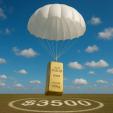China stocks rise again as emergency measures bite
Beijing (July 10) Chinese stocks rose strongly for a second day on Friday, buoyed by a barrage of government support measures, but worries persist about the long-term impact that four weeks of market turmoil may have on the world's second-largest economy.
Over the past two weeks Chinese authorities have cut interest rates, suspended initial public offerings, relaxed margin lending and collateral rules and enlisted brokerages to buy stocks, backed by cash from the central bank.
Some analysts predict further moves to come from the People's Bank of China, which often makes policy announcements over the weekend, such as another rate cut or relaxation of the amount of cash banks must hold as reserves (RRR).
The frantic efforts to stem a more than 30 percent market slide finally began to gain traction on Thursday, when shares rose around 6 percent after the securities regulator banned shareholders with large stakes in listed firms from selling.
The CSI300 index of the largest listed companies in Shanghai and Shenzhen rose another 5.4 percent on Friday, while the Shanghai Composite Index closed up 4.5 percent.
"Chinese investors move in herds," said Samuel Chien, a partner of Shanghai-based hedge fund manager BoomTrend Investment Management Co. "After panic selling drove the market down to the extreme, prices are now starting to move in the other direction."
RIPPLE EFFECT
At the depths of their slump earlier this week Chinese shares had fallen by close to a third from their mid-June peak, and for some global investors China's market turmoil had become a greater concern than the crisis in Greece.
In the first sign that market losses could feed through into depressed spending in the broader economy, China's automakers association more than halved its 2015 forecast for vehicle sales growth to 3 percent, from 7 percent, on Friday.
China will increase targeted policy adjustments: Premier
"The stock market has some impact on car sales as it hurts cash flow," association chief Dong Yang told reporters.
Analysts at Bank of America Merrill Lynch said in a research note that the biggest damage from the market turmoil was likely to be the denting of investors' faith in the ability of Chinese policymakers to manage asset prices smoothly.
The BofA Merrill analysts also expected the ripple effect to eventually hit the real economy and corporate earnings.
"We expect this will likely hurt consumption down the road," the note said. "More critical is a potential distortion to credit flows due to the impairment to financial institutions' balance sheets."
Other economists disagreed that the tumult in the stock market was likely to have a big impact on consumption.
Although China's equity market is dominated by retail investors, Julian Evans-Pritchard at Capital Economics in Singapore said only a relatively small, wealthy portion of the population owned shares.
Source: Reuters










